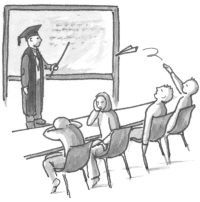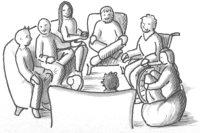Designing Collaborative Workshops
Key facilitation techniques of collaborative workshop
From sections 4.1 through 4.7 we will go over the key elements to running a successful workshop that we have experienced either as workshop participants, organizers, or facilitators.
But first, here are some facilitation techniques that we think are key to running a collaborative workshop. We will use these thoughts as a starting point, but also update the course as we get more input from you -- the participants.
Most of these tips are taken from www.seedsforchange.org.uk.
Teacher or Lecturer:

Teacher is an 'expert'. Learning from few to many. Learners have less control of their learning.
versus
Facilitator:

Only expertise needed is facilitation. Knowledge drawn from the group and shared. Learners can set the agenda and share skills and knowledge
Collaborative workshops are best run by facilitators.
Encourage experience-based contributions
We're used to workshops that end up being presentations or group discussions. They're easier to organise, but with just a little bit of work we can help participants learn much more from our workshops -- and enjoy them more, too! People remember better if they are actively involved in their own learning, and if the workshop is interesting and dynamic.
Facilitating a workshop is about helping your group to share their own experiences. You can also add your own experiences and knowledge, but the key is that everyone is really involved.
Ask yourself whether someone in the group might already know or have some experience in your topic. If you think they might have, work out a way to get them to contribute - you could use an ideastorm (like a brainstorm) or split your participants up into smaller groups and give them a task. Even if the knowledge comes mostly from you, you can plan games or role-plays -- chances for participants to reflect on their experiences to maximize participation.
Mix up the activities
We all learn in different ways so the best thing to do is to include different kinds of exercises and tools in your workshop. If you can get your participants listening, thinking, moving around and contributing at different points during your workshop, the chances are that everyone will enjoy it!
It's a good idea to make sure that people move around every 90 minutes or so - a quick energiser, physical activity or just changing seats can help stop people from nodding off!
Listen Actively
Active listening is a key facilitation skill: it's when we proactively look and listen for what someone else is trying to communicate, while trying not to project our own thoughts and expectations onto them. In workshops it is vital for working out what participants already know and think about the topic. This means you can adapt the workshop to their needs, deal with anything you think they have misunderstood, and avoid wasting time telling them things they already know.
Show that you're listening. Be aware of how body language such as an interested facial expression and maintaining good eye contact helps participants feel valued. Avoid signs of impatience such as looking at your watch, or flicking through your notes. Try not to fake it! You might have half a mind on figuring out how to save time in the next exercise, but you do also need to focus on what someone is trying to say.
Distill and Summarise
Summarising is closely related to active listening. You can show people that you've heard them properly, and have understood their point by rephrasing the core of what they said and offering it back to them. It's important that you don't simply repeat what they said word for word, but show that you've understood any emotions or key concepts they've expressed.
A good summary not only shows participants that you have listened, but is also an effective way to check whether you've understood them. Offer the summary tentatively -- use phrases such as: What I hear you saying is... is that right?' or: 'Would it be fair to say that you feel...?' If you restate in bold terms such as: 'So you feel that... or: 'You believe...' and you're wrong, not only does it show that you haven't been listening, but you risk offending the speaker by misrepresenting them. Summarise succinctly -- learn how to boil things down into one or two short sentences. This is essential if your summary is going to make things clearer and help move the discussion forward.
Ask Questions
Questioning is a technique often used by facilitators during workshops as an alternative to presenting information and giving answers. Asking the group a question, or series of questions can enable them to find their own solutions and puts them in control of their own learning. Effective, well-planned questioning can support people to reflect on and learn from their experiences.
Ways of asking questions
Here are some strategies for ensuring your questioning gets good results:
- Have a clear aim. What learning are you trying to achieve? When you are planning the activity, prepare questions that reflect this.
- Think about how the words you choose will impact the answers that you get. For example, there's a big difference between 'How did you feel?' and 'What did you think?'. Do you want participants to discuss emotion and experience (the first question), or ideas and opinions (the second question)?
- Use open questions when you want to open up and explore issues. Use them to draw people out and to let participants direct what is to be discussed. Open questions are questions that cannot be answered by a simple 'yes' or 'no' answer. They start with words such as 'Why...?' or 'What happened...?'
- Closed questions generally invite a 'yes', 'no' or 'don't know' answer. There is a place for closed questions when you want to clarify points, get information quickly or when you want to deliberately restrict options, for example 'Would you like to stop now, or go on for another 15 minutes?' excludes the possibility of going on for more than 15 minutes. Whereas the open question: 'How much longer do you need?' could leave you carrying on for another hour or more!